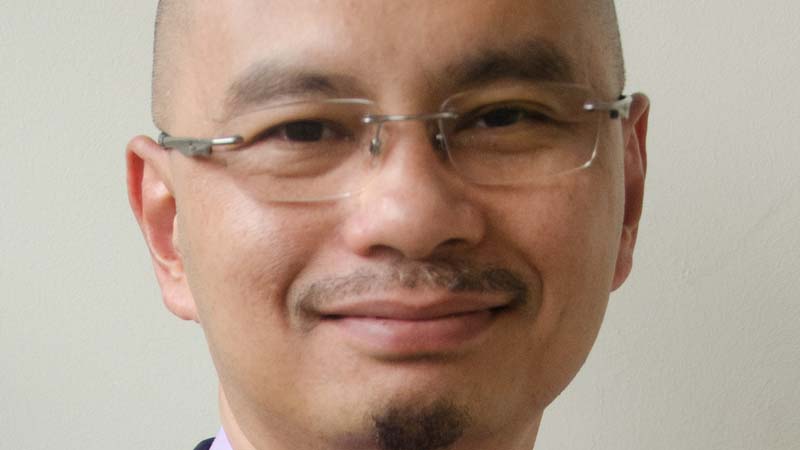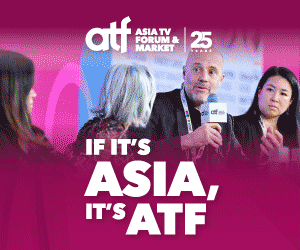
On getting Dirk Gently into development with BBC America
“We go out and scout and find strong IP, strong ideas, strong concepts, options to books, options to screenplays; we spend our own money developing the initial work, but we always do it with partners. In the case of Dirk Gently [an anthology series set in the unexpected world of the hyper, absurd Dirk Gently], our partners are IDW, one of the largest publishers in the U.S., and Circle of Confusion, producer of The Walking Dead... And I think that was how it was deemed to be very credible – strong writer, strong attachment, notable people working with us.”
On establishing credibility for a Malaysian company on the global production stage
In the U.S. it’s like swimming in a sea of sharks and strange creatures... It helps that we established the right strategy (ie. owning the IP), spending our own money initially, which is necessary for us to have that seat in the room... So that worked, and we have a few more development deals that are heading that way, so we are very happy.”
On the surprises, good or bad
“In the U.S., the surprise was it was both difficult and easy. Difficult because, we’re a small company... Easy because, the moment you have the right elements, the industry is quite welcoming. In fact, I think over there they welcome money... ‘Oh, Asian money, so welcome’. Then they will find reasons to believe in you.”
On scripted development in Asia
“We want to make sure people see there is demand for original scripted content, which has to be at a certain level, meaning money wise, budget wise, concept wise, as well as all the other sensibilities. We are not producing local-language content. We are still producing premium English-language content. The issue is economics, because the market is only so big; broadcasters over here want certain things, and want to make sure that what we have, or what we bring to the table, is something that solves their problems, as well as something they will use for their own growth too.”
On challenges within Asia
The challenge has been finding the right relevance... We should do more scripted, we should tell more Asian stories, we should tell more and more of our own unique stories. And I think that’s a space, as you have seen in the past three years, tha...
On getting Dirk Gently into development with BBC America
“We go out and scout and find strong IP, strong ideas, strong concepts, options to books, options to screenplays; we spend our own money developing the initial work, but we always do it with partners. In the case of Dirk Gently [an anthology series set in the unexpected world of the hyper, absurd Dirk Gently], our partners are IDW, one of the largest publishers in the U.S., and Circle of Confusion, producer of The Walking Dead... And I think that was how it was deemed to be very credible – strong writer, strong attachment, notable people working with us.”
On establishing credibility for a Malaysian company on the global production stage
In the U.S. it’s like swimming in a sea of sharks and strange creatures... It helps that we established the right strategy (ie. owning the IP), spending our own money initially, which is necessary for us to have that seat in the room... So that worked, and we have a few more development deals that are heading that way, so we are very happy.”
On the surprises, good or bad
“In the U.S., the surprise was it was both difficult and easy. Difficult because, we’re a small company... Easy because, the moment you have the right elements, the industry is quite welcoming. In fact, I think over there they welcome money... ‘Oh, Asian money, so welcome’. Then they will find reasons to believe in you.”
On scripted development in Asia
“We want to make sure people see there is demand for original scripted content, which has to be at a certain level, meaning money wise, budget wise, concept wise, as well as all the other sensibilities. We are not producing local-language content. We are still producing premium English-language content. The issue is economics, because the market is only so big; broadcasters over here want certain things, and want to make sure that what we have, or what we bring to the table, is something that solves their problems, as well as something they will use for their own growth too.”
On challenges within Asia
The challenge has been finding the right relevance... We should do more scripted, we should tell more Asian stories, we should tell more and more of our own unique stories. And I think that’s a space, as you have seen in the past three years, that is growing, which is an excellent trend indeed.”
On finding a workable formula for Asia
“There is a lot of appetite to tell stories in Asia, but we’re struggling to find the right formula. I mentioned economics just now. How much money can we raise here? How much money can we raise from other markets? How can we make sure that we’re able to make the show a reality?”
On raising production funding in Asia
“Fifteen years ago we did not see as many of these big, big entertainment formats done by local broadcasters in Asia, and now we see a few a year and a few per channel. Ten years from now, that will be the same story for scripted content. But at that very nascent stage, it’s a question of faith; it’s a question of who wants to be brave enough, bold enough, innovative enough to differentiate their platform or their channel with unique content. And I think that’s what we’re trying to champion.”
On pressure to favour all things Malaysian
There is no pressure at all [from owners Khazanah, the Malaysian government’s investment fund, and Astro]. This is a global play. We have 12-15 projects in development right now, the bulk of which are international, in English, with a few in local languages for Malaysia and Indonesia.”
On the best ways to tap Ideate funds
“Raise your hand, write to me, and then come and talk to us.”
On getting to yes
“We tend to say no to single ideas or single stories, the ones where all the heroes get killed. We want to see franchise potential – sequels, prequels, versioning into different languages and obviously into ancillary. In all the things that we do, the ancillary stuff is designed from day one. Together with the long form we develop all the digital and short form content at the same time. So, in fact we are almost agnostic to the final format. When we see an idea in IP, we don’t say that this is a TV format; we sort of look at it and get it into the black box and ask, ‘What’s the right format for it?’, instead of being fixated on whether it’s a feature length film or TV. That’s our approach.”
This article first appeared in ContentAsia Issue 6, 2015, published in December 2015.



















